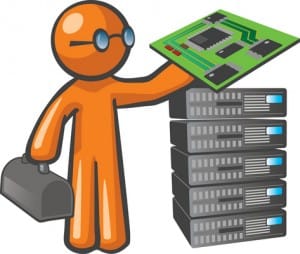
A server is a very important asset to any small business as it provides many features that can help your business run safely and efficiently.
For instance, when lending out a new or existing computer to employees, you can prevent unnecessary access, change passwords, or unlock accounts in one location. This allows management of the computers, enabling full control at all times.
It also allows you to have a centralized location for many of your functions: the server. You can share files and applications and reduce redundancy for all files. Since servers primarily run in a RAID configuration of some sort, you will have extra protection for your most important files.
Another great thing about a server is you can set up a domain for your business, enabling automation features like backups in one place.
This also allows for profiles, including files and applications, to be accessible from any workstation connected to the server. Not to mention, a server will keep you organized and running more efficiently in general by keeping your email, contacts, calendars, and files safe.
Data transferring to and from a server is much faster than transferring from a computer due the overall design of a server. Servers are built for speed, reliability, and security purposes.
This means you are going to get through the day with your time and resources spent more wisely, allowing you to continue with what matters in your business.
This efficiency and organization will increase customer relationships and help build retention with new and potential customers.
Best of all, you can set up a server to curve toward your needs. You can use a server for hosting your own websites, as a backup server, fileserver, or even run your database. You can also upgrade (to an extent) if your needs grow.
Keep in mind, these are only some of the many server configurations available for your server.
File or Backup Server
This server is for file-sharing, active directory, and domain services. It’s primarily used for backups and storage of user files.
This is the best option if you are going to need safe storage services for your business since a server is going to have redundancy storage to keep data safe.
Database Server
This server configuration is for database storage and management of SQL, Oracle, etc. This is a necessary option if you are utilizing a database for your business.
Again, utilizing a server is going to allow safe keeping of your files – this includes your critical files such as your database files.
Web Server
This configuration is for webhosting services and will allow hosting and management of a website from your office.
This is a great option for running web-based applications through your server. This option can also be done off-site by a website host if you prefer to go that route for faster access or security.
Utilizing a server is important for your business and choosing a server can be tough, let alone installing one yourself. Let Tech Experts help you decide and make sure you get the best option possible for your small business.





